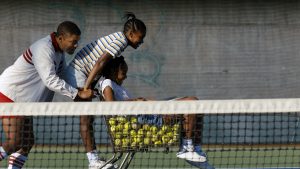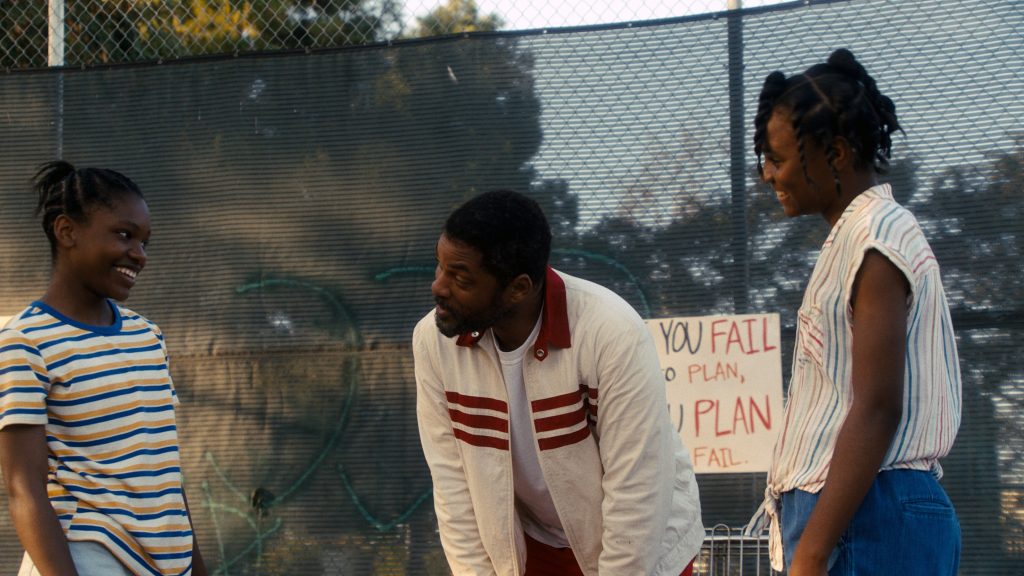The biopic of tennis stars Venus and Serena Williams is not so much about them and tennis as it is about their family, especially their father and coach, the titular King Richard.
In 1995, budding tennis star Venus Williams, aged 14, was needled on TV by a white male journalist questioning the sincerity of her adolescent confidence. Her coach and firebrand father, Richard Williams, intervened. “You’re dealing with a little Black kid,” he told the reporter in the now infamous clip. “Let her be a kid.”
Actor Will Smith was struck by the segment when it first aired. “The look on Venus’ face burned in my heart,” he says. “That’s how I wanted my daughter to look when I showed up, like she had a lion. She was so confident and so comfortable that her lion wasn’t gonna let anything happen to her. You know, I fell in love with Richard Williams.
“That was 20-something years ago, and when the opportunity to be part of this came up, that was the first thing I remembered. I wanted to show a father protecting a daughter like that, to the world.”

Smith plays Williams in the heartfelt biopic King Richard, directed by Reinaldo Marcus Green (Joe Bell). The richly detailed drama charts the patriarch’s plan to mould his modest preteen daughters, Venus and Serena, into the Grand Slam champs we know today.
It may seem counterintuitive, even male-centric, to make a film about the Williams sisters – two of the world’s greatest living athletes – skewed through the identity of their divisive father, whose boisterous extroversion is nailed by coach Paul Cohen (Tony Goldwyn, Scandal) when he tells Richard, “You are the most stubborn person I’ve ever met, and I coached McEnroe.”
But centring the story in Richard Williams’ experience opens up thematic and narrative territory beyond that of an ESPN special. Though the tennis sequences are plenty exciting, King Richard scores more points off the court, around the dinner table, in the Compton home shared by Richard, his wife Oracene (Aunjanue Ellis, If Beale Street Could Talk) and their five spirited children.
“I wanted to make a movie that my mom could see,” says director Green, seated on a tennis court with his cast and key creatives alongside Venus and Serena Williams at the film’s global press conference in LA. “She’s never seen a tennis match before, but she understands what winning and losing is. She understands what family is, what love is, what struggle is.
“Will and Aunjanue [were] the backbone of the family – not only in the film but on set, creating an environment for everybody to excel. It was amazing to have those co-captains on the field.”
This isn’t the first time Smith has played a parent up against the odds. A father of three, he starred alongside his real-life son Jaden in The Pursuit of Happyness (2006) and After Earth (2013). He brings ferocity, tenderness, wisdom and, well, willpower to his portrayal of Richard – a man who, by all appearances, dedicated every waking minute to his family.
“My father was military,” says Smith. “When I was growing up, the kids don’t get a vote. You do what’s laid out for you, what’s established for you.
“In our first meeting, Venus said, ‘You know, it’s almost like they brainwashed us. Our punishment was that we couldn’t play tennis,’” he laughs. “It was like a Jedi mind trick. It wasn’t the standard thing of a parent pushing a child. It was throwing fuel on a fire coming from inside of Venus and Serena.
“That was a new parenting idea for me, of aligning with your children versus directing your children,” Smith continues. “It wasn’t, As a parent, I know and you don’t. You’re going to do what I say because I’m right and you’re little. It was a very different approach that was somewhat eye-opening.”
Born in Shreveport, Louisiana, in 1942, much of Richard’s early life – referred to in oblique drop shots throughout the film – was marred by rampant racism in the Jim Crow-era South. King Richard hints that this adversity catalysed the brash personality that made him both a thorn in the side of hoity-toity tennis parents in 1990s SoCal, and an easy target for media ridicule as his daughters rose to sporting prominence. Williams was oft seen animating prim and proper Wimbledon grandstands, brandishing a whiteboard with handwritten missives like “Welcome to the Williams Show!!”, prior to experiencing his first of several strokes in 2016.

So reverent is King Richard in rendering its title character that some critics have called the film a hagiography, bobbing and weaving as it does around the fact of Williams’ first family: the five children he seemingly forgot after shifting focus to his prodigiously gifted daughters (whose career he mapped in an 85-page tome before they were even born).
“That vilification is still out there,” says his stepdaughter, Isha Price. An attorney by trade, she joined the project as an executive producer alongside her little sisters, because establishing trust and maintaining mutual respect with the filmmakers was a key concern. “It took some time to get there with my family, because there was a bit of distrust – as you can imagine, being in the public eye for as long as they have. Oftentimes in sport, you get one chance – one time to step up to the line and serve that ball – so you to want to make sure it’s right.
“I might have gotten on a couple of people’s nerves on set, but I had a responsibility to my family,” she explains. King Richard may be named for their patriarch, but Price wanted to ensure due credit was laid upon their fiercely devoted mother, Oracene “Brandy” Price.
“We have these stories where you have the heroic male figure,” says Aunjanue Ellis, Oracene’s on-screen conduit, who transforms the narrative when her character confronts Richard over his paternal and spousal shortcomings. “To do something where we did not see that Miss Oracene was a co-conspirator of this crazy dream would have been dishonest. We tried to give her the presence she deserved because that’s the truth.”
Tennis may not be a team sport, but filmmaking is, and Ellis is also quick to recognise her co-stars, Demi Singleton and Saniyya Sidney, who play Serena and Venus, respectively. “I worked with these amazing young women,” she says. “They educated me. They make it look easy: I’m just having a good time with Will Smith today. But that’s the deception of their genius. [Not] everybody can have such a lived-in experience like that on camera.”
Just shy of 15, Singleton is an actor, singer and dancer previously seen in the crime drama Godfather of Harlem. To prepare for this major undertaking, she says, “Saniyya and I did a lot of research. It was really important to us that everything we did was real, because this is not our story, it’s theirs.” Surprising, then, that their conversations with the Williams sisters touched on everything but tennis. “We spoke about their life, their childhood, the people they dated growing up,” says Singleton, laughter volleying across her castmates.
“To make sure we were portrayed in the right way,” Serena clarifies, tongue in cheek.
“It was a cool conversation,” Singleton continues. “We got to speak to them as people. Serena and Venus,” she says, addressing them, “you are two women I’ve looked up to my entire life, so it was really fun to get to know that side of you.”
“It was important I let people know just how big of a heart Venus has,” adds Sidney, 15, who’s appeared in Roots, Fences and Hidden Figures. “I had such an amazing experience getting to create this family. And I was excited to try tennis.”
That’s right: both Singleton and Sidney had to learn to play the game like two of its all-time masters – a daunting prospect familiar to Smith, whose 2002 turn as indomitable heavyweight Muhammad Ali was Oscar-nominated. “There are professional fighters who can’t move like Muhammad Ali,” he says. “There are professional tennis players that can’t play like Venus and Serena. I want the world to know that not only did Saniyya learn to play like Venus – Saniyya is left-handed. She learned to play like one of the greatest tennis players of all time with her off hand,” he says with pride.
“Being able to step into Venus’ shoes helped me grow as a young woman,” adds Sidney. “They were so humble at such a young age, and they had such a great father. Again, family is everything.”
“That’s what I really loved about this,” says Venus. “It’s a family film. Even if you don’t understand tennis, you understand family, and with a family, you can do anything. Some of us are born with that, some of us have to create those families, but surrounding yourself with family can take you higher.”
King Richard is in cinemas now.
By Aimee Knight (@SirAimeeKnight), The Big Issue’s Film Editor.
First published in The Big Issue, ed#653.
